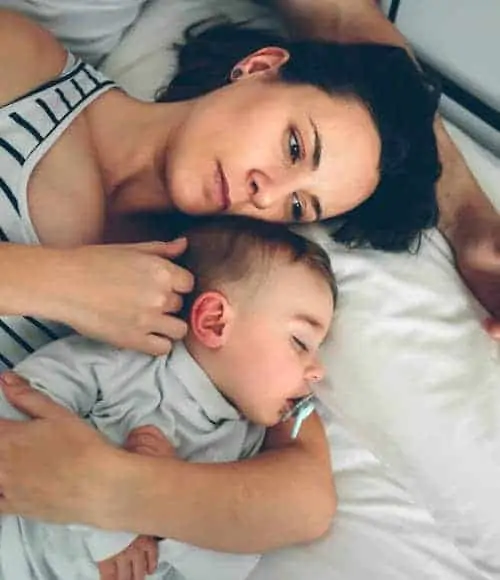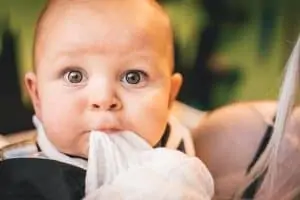No, you’re not the only one that heads to the nursery to make sure your baby is still breathing. I did it ALL the time when both of my daughters were babies. And I still do it now, even though they’re big.
Breathing is a big part of life because without it, well, we’re just not. So, it stands with good reason that you’d be concerned if you hear baby noisy breathing. But how do you know if it’s normal when your infant snorts when breathing? Or is your newborn rattle breathing? Or when baby breathing sounds like gasping?
Whatever you want to call it, when baby is making weird breathing noises, you could do with some added peace of mind. And that’s what I’m here for. We’re going to talk about the baby’s breath and breathing, what to look for, what it could indicate, and when you should take action immediately.
What to Know About Newborn Breathing
It should be comforting to know that newborns have a different breathing pattern than adults and older children. Sometimes they breathe rapidly or take pregnant pauses between breaths. They may make unusual noises as well, like infant squeaks when breathing.
Note that,
Babies tend to breathe more through their nostrils, and since their breathing pathways are smaller, they’re easier to block up. Plus, they’re still developing. As they grow, these things will strengthen, and they will breathe regularly.
Naturally, this special little miracle in your arms is everything to you now. And so try as you might not to worry, you do it anyway. And that’s purely fine since I at one time did the very same!
I was lucky to have my breastfeeding coach, who told me what to look for so I wouldn’t worry needlessly.
So, what is normal for a newborn?
Generally, they will take 30 to 60 breaths in one minute. When they sleep, it can slow to 20 breaths a minute. Once they make it to 6 months, it changes to 25 to 40 breaths a minute. For comparison, adults breathe 12 to 20 breaths a minute.
Additionally, newborns may pause their breathing for up to 10 seconds after taking rapid breaths. The first time it happened to me, I was dialing Vivien in a panic. She assured me this was completely normal, and showed me what to look for, err, listen for instead.
Baby Noisy Breathing Noises Revealed
Pay attention to your baby’s breathing. This sound guide will help you determine if you are worrying or if something is wrong.
Whistling
If you hear a whistling noise, it’s likely a small blockage in the nostrils. Since babies breathe out of their noses in the first tender weeks, any blockage of those tiny noses will surely create a whistle. Mucus and dried breastmilk or formula can get in there to clog things up. You can clear it out, which will make you and your baby happier.
Barking cough
Usually, with a hoarse cry sound, the barking you hear is due to blockage in the windpipe, the likely culprit being mucus. If baby breathing sounds like phlegm or baby breathing sounds congested, it could be croup. This is definitely one to see the pediatrician about!
Squeaky and high-pitched

If a baby makes a high-pitched gasping noise when breathing in, it’s something newborns do. You may notice it’s worse when they’re lying on their back. While it might sound alarming, it just has a case of stridor or laryngomalacia on your hands. It’s from excess tissue around the windpipe, and your child will outgrow it in toddlerhood.
Still, you will want to see the doctor to be sure whatever causing this baby noisy breathing sound is harmless!
Deep cough
Different than when the baby has a phlegm sound when breathing, a deep cough is caused when there is a blockage in the large bronchi. That’s the portion where the trachea heads into the lungs, in case you were wondering. An infant with a deep cough should definitely see the pediatrician!
Baby breathing sounds wheezy
In the small airways, if there is a blockage, it will make a whistling sound. Some may call it more of a wheezing, though. If you have cleared your infant’s nostrils of any mucus or milk and you still hear it, you will want to have things checked out. It could be asthma, pneumonia, or a respiratory virus.
Fast and labored
While infants take more breaths per minute (and hence why you should know how many of those speedy breaths is normal), this type of fast breathing seems like a struggle. This could be the work of an infection. Pneumonia is a possibility here, too, so get to the doctor.
Snoring
Is your baby noisy breathing while sleeping? It’s most often just some mucus caught in the nostrils and usually nothing to worry over. However, it can be a sign of a deeper condition like sleep apnea. If you have any concerns over the sounds that your baby makes when snoring in the night, you can capture those on video and play for your pediatrician.
Grunting
And finally, I’ll end with a noise that should be on your urgent list. Luckily though, it’s not all that common. It’s very low-pitched and sudden when your baby exhales, and if you hear that type of sound, it’s a problem with the lungs. Generally, it indicates a severe infection and will likely be coupled with other symptoms, which will propel you to the doctor’s office immediately.
When to Worry and What to Do About Baby Noisy Breathing
So, I’ve covered the sounds to look out for when the baby makes weird noises while breathing. On your cheat-sheet, you should put:
- Occasional noisy breathing or weird breathing = totally normal
- Persistent noisy breathing = not normal; needs medical diagnosis

Other things you should look for when wondering if you need to load everyone up on a visit to your pediatrician, urgent care, or ER:
- Increased rate of breathing on a persistent basis (over 60 breaths per minute).
- Laboring to breathe – this can include grunting as we discussed above, flaring of the nostrils, and any visible chest muscle retractions that are deeper than usual.
- Blueness in lips and tongue, a sign your child is not getting enough oxygen from the lungs.
- Not feeding well, a strong indication that your baby isn’t feeling well. This is a general symptom that something is wrong and something you should always watch out for. It almost always precedes an illness.
- Lethargic behavior, which I know is hard to spot in a baby, but you will notice that they have significantly less energy if there is a problem with the lungs.
- Fever – most babies and children, will show a fever when there’s an infection of any kind.
So, run a check through those things. And even if you can’t check anything off but are worried, it’s better to check with a doctor to be sure. Those tele-visits can be a wonderful thing when you have a weird baby breathing noise on your hands and can give you peace of mind without having to leave home.
If you’re concerned, you can do a few things to get your mind off worrying.
Know what normal baby breathing looks and sounds like
For starters, you want to observe your baby’s breathing from the start. Get used to how infants breathe and know what’s normal here to put your worries to rest. This way, when something is abnormal, you’ll be able to spot it.
Record it
If you still keep hyper-focusing and wonder if the baby is breathing normally or if something is wrong, grab your smartphone and make a video. This is especially helpful when the baby is sleeping so you can easily show your pediatrician precisely what is making you worry. Plus, in the case of sleeping, it’s tough to get your baby to go to sleep in a stark doctor’s office and get to the point of snoring at that!
Back sleep is best
While we’re on the subject of snoring and sleeping, don’t forget to put your baby to sleep on their back. This reduces the risk for SIDS. Even with a respiratory infection, back sleep is best. You can elevate the mattress from underneath slightly to create a very gentle incline and keep mucus from causing congestion that causes weird baby breathing noises.
See if you can clear the congestion
Thick mucus can cause those tiny airways to get all stopped up. Often, the baby just needs your help clearing the way. Everyone gushes over the Snot Sucker, which gently, safely, and effectively helps you remove snot from baby noses. It doesn’t go up the nose yet sucks out all the gunk. It comes with a saline solution, too, a natural and safe substance to help things along.
Check on baby’s comfort

I do want to point out something about babies and kids in general as well. When kids are uncomfortable, they will often breathe more rapidly. I can tell you BOTH my daughters are the same way when they get upset at their ages.
And as babies, it was much the same, though few things upset a baby. Those things will make the baby cry, for sure, but it’s not as complex as, “Sister stole my Barbie and won’t give it back!”
Believe me.
Another reason a baby may breathe faster than usual may have to do with clothing. I was always arguing with my Chinese in-laws about this. They would try to add too many layers to my daughters’ outfits. This would result in overheated kids that would be quite cranky and upset.
If you think you’ve overdressed your baby and it could be the cause, remember, only add one extra layer onto your baby than what you are wearing yourself for that day’s weather. That golden rule should help you out.
When in doubt, it never hurts to carry an extra layer in the diaper bag or receiving blankets. I used to stash those in my bag so that I could bundle and unbundle my daughters to keep them comfortable wherever we were.
Fabrics should be breathable too. I know some of the clothes out there are just darling but think comfort and practicality when you’re out and about. That cute baby dress won’t be so cute anymore when your baby doesn’t stop wailing because she’s uncomfortable in it.
One more thing about noisy baby breathing…
As a new mom, you will worry a ton about everything. Most of the time, it’s nothing to worry about. Babies do make unusual noises when they nurse and feed, sleep, poop, and even just because. The key is noting if it is persistent, accompanied by other symptoms, or random. If the baby isn’t acting like her usual self, struggles to breathe, or has blue lips, it’s important not to worry but to get medical treatment right away.
So, breathe in, breathe out, and breathe in again now that you’re armed with this baby noisy breathing information!
Leslie Berry lives with her husband and two young daughters in Los Altos, California, where she loves helping other moms get comfortable with motherhood and embracing the insanity with facts peppered with laughs.
She loves eating too much sushi, exercising, and jamming out on her Fender. Read more about Leslie here.



